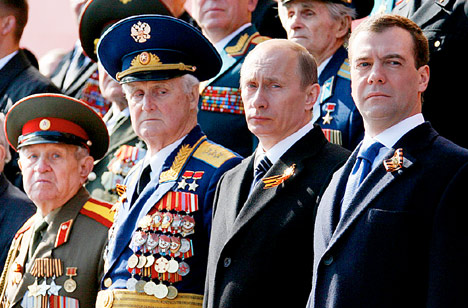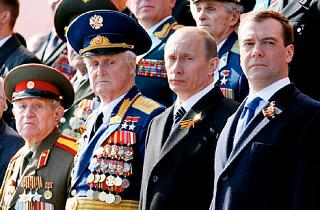Putin presents Russian People with Terrocracy
Kleptocracy: "government by those who seek chiefly status and personal gain at the expense of the governed; also : a particular government of this kind." (merriam-webster.com) Sale of arms, oil, gas plus related goods and nuclear reactors have greatly supported economy of Russia which had emerged in 1992 as the strongest nation from the break up of erstwhile Soviet union of 15 states. Today Russia, like any other terrocracy in the world, targets Muslims indoors and aids the monstrous GST (global state terror) gangs led by USA-UK terror twins under the notorious NATO terror syndicate for return favours, and seek their support to retain Muslim nations like besieged Chechnya, within Russian federation under the Kremlin terror boots. Claiming to be the overwhelming favourite to return to the position he first held 12 years ago, the Russian Prime Minister, Vladimir Putin, has defended his decision to stand in next year's presidential election. He energetically defended the plan to swap places with Dmitry Medvedev. Putin denied it was a quest to retain personal power, insisting that he needed longer to raise living standards and make Russia stronger. The present Putin-Medvedev fascistic duo just prolongs the authoritarian trends by using all resources, including military, intelligence and media. Western support ensured by the Kremlin following the CIA's sept-11 hoax helps the prolongation of oppression of Muslim nations. In advance of next month's parliamentary elections and the March presidential vote, the foreign experts, invited by the Russian government to discuss the state of Russian politics, were taken to the livery yard in the countryside at a French restaurant outside Moscow outside Moscow where Putin, the Judo champion, keeps his horses. Putin tried to impress upon the guests about his sincerity over tea. Stability and more security seem to be the top priority of Putin - the means to protect the country from itself and from foreign enemies and the key to future prosperity. His argument is based on his record over the last 12 years. Russia, he said, had seen living standards double, a dangerous "civil war" in the Caucasus had been ended and Russia's economy had been saved from virtual collapse. Putin, a former key KGB agent, seems convinced that he is the only leader who can hold the country together. Putin denies it is Russian society that is dynamic and its politics regrettably stagnant. Russia's political model might not be perfect, he argued, but that did not mean it would lead to a Brezhnev-style era of stagnation. It was not about hanging on to power, Putin said, and all about the weak state of Russia's institutions. “We’d like there to be more internal resilience, so we can hand over power with a politically mature system. But it's not easy and it takes time," he said. Hollow nationalist rhetoric that had bound the Soviet people, continue operate in a “free” Russia as well and the Sept-q11 has only escalated that trend in Russian system. Putin who had already solved Russia's main political riddle by announcing his plans to swap jobs with President Medvedev and return to the Kremlin after a 2000-2008 stint as head of state said his likely second presidency will almost certainly look a lot like his first: based on "a love for the Motherland" and tough security and defence. Putin argues that the best gauge of his political system's success was the economic growth that Russia experienced in the past decade despite the 2008-2009 financial crisis and the current uncertainties over European debt. The size of the economy has doubled. But the Kremlin quickly got rid of regional elections and tightened controls further in response to a deadly series of “strikes” such as the Moscow theatre genocides and the Beslan school hostage crisis of September 2004. Putin defended all of his policies while conceding that the system he introduced was "not ideal". "The current model allowed us to end the civil war," Putin said in reference to the North Caucasus fighting. Putin added he does not know if there are ideal political systems. Putin's first term witnessed the state control of all the major television stations and elimination of political parties through restrictive campaign laws. Putin lamented the dearth of suitable leaders to shoulder the top Kremlin responsibility and argued that one of the problems in Italy, as in Russia, was finding suitable candidates capable of taking over the helm. Putin called his “good friend” Silvio Berlusconi, Italy’s disposed PM, “one of Europe's greatest politicians" whose many years in power had - much as he had in Russia - given Italy much needed continuity. The biggest criticism facing both Putin and Medvedev is that they essentially decided the presidential election between them without ever giving voters a fair say. Medvedev recently compared his choice to stand aside in favor of Putin to Madam Hillary Clinton's decision to join the president B. Obama's team after their bruising 2008 primary. Putin for his part said the criticism he faced for agreeing to replace Medvedev seemed inappropriate when British prime ministers such as Tony Blair simply handed over power within their party letting Scot Gordon Brown step into Blair's dirty shoes. Russia seems to be deliberately creates confrontations with USA and Europe to keep the Russian folk under the state control. Moscow's confrontation with the West meanwhile deepened over the US-led war in Iraq and eventually required Washington to introduce its famed "reset" of Russian relations, once Medvedev settled in as president, in 2009. Russian media have exceedingly promoted the Putin-Medvedev duo and the vanguard of new Russian state. Even the less popular Medvedev would have almost certainly won in a country where state media dominate and the opposition is a fractured and enfeebled force. Unless some miracle happens, the Putin-Medvedev tandem possibly is in Russia to stay. An Observation Moscow scorns western democracy claims but does not think Russian deserve any real freedom. Putin, by oppressing those who supported opposition also promoted rampant corruption and crimes; he only helped the oligarch and other crony capitalists to loot the resources of Russia while allowing the decay of the poor, both urban and rural. The Kremlin represents imperialist militarism and authoritarianism and Putin who had earlier promised to consider sovereignty for the Chechen when situation improves "on the ground" now must keep his word but it looks he perhaps wants to use the economic clout to further cripple the Chechnya movement. When the cricketer turned Pakistani Justice party leader Imran Khan said he is the only choice for people of Pakistan there is some point in it because, as he adds, all other leaders are self-centered, like sport persons, extremely corrupt, they are frauds and criminals have failed. But when Putin says the same it becomes a Obama joke. given the Soviet style system still operating in Russia, Putin is perhaps fully assured of a win once again. If he wins next year's elections as expected, in theory Putin could theoretically be Russian president till 2024 – if not further extended further by special ordinance, in power one way or another for nearly a quarter of a century. Many former Putin supporters seemed aghast at the prospect of the man who had already ruled them for 12 years coming back for more. But critics say his political influence over Russian society and system is an increasingly destructive force. Some say a bonanza in oil prices is part of that equation. Putin systematically refused to address the equality among Russians in resources and services. Nor has he said anything about containing the power of the powerful oligarchs controlling the “lawmakers”. There was much talk of stagnation, rampant corruption, and a dangerous political inertia that some thought might eventually lead to a social explosion. Opinion polls reflect a growing malaise at the wide gap between the obscenely rich and the tragically poor, exacerbated by a belief that Russia these days is being ruled by a mafia-like clan which is more interested in enriching itself than helping solve the country's problems. Putin can further consolidate his position as well as of his associates in Kremlin by using the “threat” gimmicks. So, the re-election of Putin is not at all the issue in Russia today, but where exactly Russia is heading to is certainly the core point of international debate. About the writer: Dr. Abdul Ruff, Specialist on State Terrorism; Educationalist; Chancellor-Founder of Centor for International Affairs(CIA); Independent Analyst; Chronicler of Foreign occupations & Freedom movements(Palestine, Kashmir, Iraq, Afghanistan, Pakistan, Xinjiang, Chechnya, etc); Anti-Muslimism and anti-Islamism are more dangerous than "terrorism" Anti-Islamic forces & terrorists are using criminal elements for terrorizing the world and they in disguise are harming genuine interests of ordinary Muslims. Global media today, even in Muslim nations, are controlled by CIA & other anti-Islamic agencies. Former university Teacher. Website http//www.
Fascistic authoritarianism and militarism have sustained Russia so far as a solid global state terror coordinating all its operations with USA and other state terrorist nations.
Comments
There are 0 comments on this post













